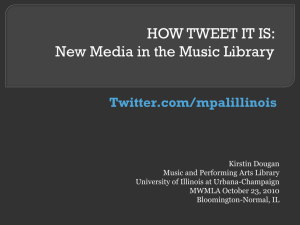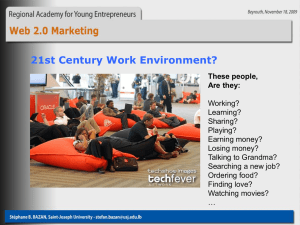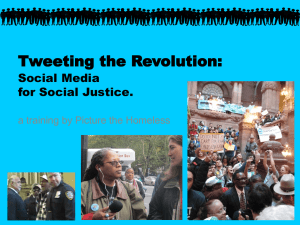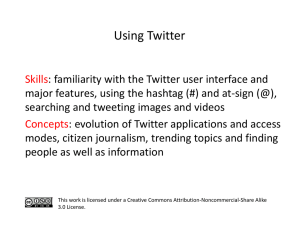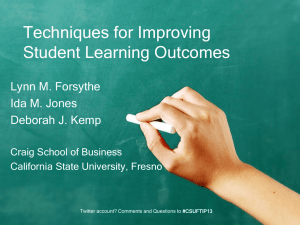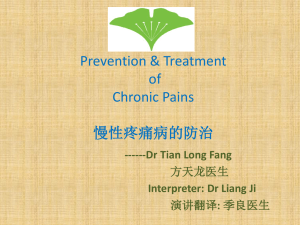Powerpoint Slides - Centre for Global Health Research
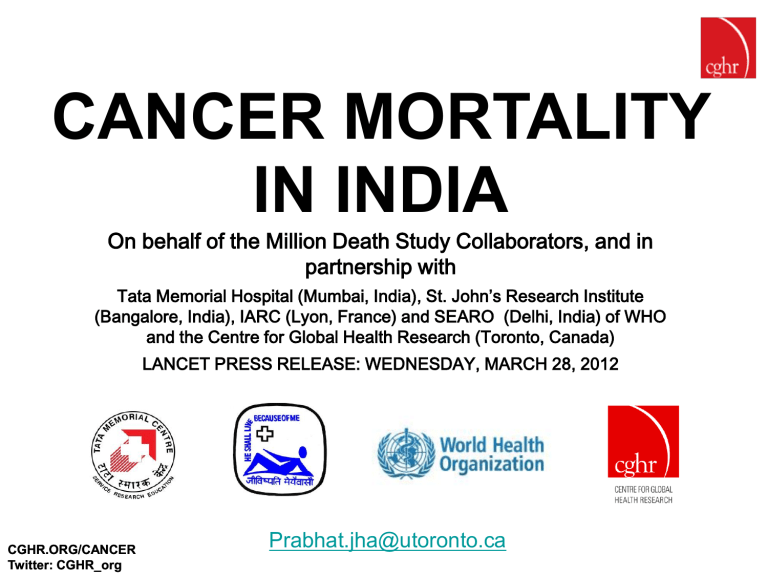
CANCER MORTALITY
IN INDIA
On behalf of the Million Death Study Collaborators, and in partnership with
Tata Memorial Hospital (Mumbai, India), St. John’s Research Institute
(Bangalore, India), IARC (Lyon, France) and SEARO (Delhi, India) of WHO and the Centre for Global Health Research (Toronto, Canada)
LANCET PRESS RELEASE: WEDNESDAY, MARCH 28, 2012
Prabhat.jha@utoronto.ca
Key findings
• About 0.6 Million (M) or 6 Lakh cancer deaths in 2010
• Over 70% of cancer deaths occurred during ages 30-69 years
(200,000 men and 195,000 women)
• At ages 30-69 years, the three commonest fatal cancers
– Men: oral, stomach, and lung
– Women: cervical, breast and stomach
• Tobacco-related cancers are over 40% of male and nearly 20% of female cancers
• Cancer death rates are similar in rural and urban areas
• Huge variation in cancer death rates across states- partly due to tobacco, and partly for reasons awaiting further discovery
• Cancer death rates 2-fold higher in the least educated compared to the most educated adults
• Cervical cancer death rates far less in Muslim women than among Hindu women
Source: Dikshit et al, Lancet 2012
CGHR.ORG/CANCER
Twitter: CGHR_org
What’s new about this research?
• First large, nationally-representative study of cancer mortality in India, reflecting both urban and rural areas
• Previous cancer estimates have relied mostly on cancer registries in cities, but
70% of Indians live in rural areas
• Provides distribution of cancer deaths by area, educational level, and religion
How was the study done?
• Nationally representative sample (Sample
Registration System)
• 6,671 of these small areas randomly chosen from all parts of India (each with about 1000 people per area)
CGHR.ORG/CANCER
Twitter: CGHR_org
How was the study done?
800 Registrar General of India field workers interviewed 122 thousand families of people who had died in 2001-2003
Written reports each coded independently by at least two physicians to attribute a probable cause of death (i.e., cancer)
Cancer deaths grouped into broadly similar categories (i.e., oral, lip and pharynx; lung and trachea, etc.)
CGHR.ORG/CANCER
Twitter: CGHR_org
How was the study done?
Calculated proportion of all cancer deaths by age, gender, and cancer type within the study
Combined with national 2010 UN totals of deaths, and 2007-2009 state-specific SRS death rates
CGHR.ORG/CANCER
Twitter: CGHR_org
Produced national and state estimates of rates and number of cancer deaths for 2010
Key results
• 7137 of 122 429 study deaths were due to cancer, meaning about 600,000 cancer deaths across the whole of India in 2010.
• Some 71% (395,000) of cancer deaths occurred in people aged 30-69 years (200,100 men and 195,300 women).
• At ages 30-69, cancer deaths are:
8% of the 2.5 million total male deaths
12% of the 1.6 million total female deaths
Source: Dikshit et al, Lancet 2012 CGHR.ORG/CANCER
Twitter: CGHR_org
Leading cancers in men and women, age 30-69 years
MEN
• Oral 45,800 or 23%
• Stomach 25,200 or 13%
• Lung 22,900 or 11%
WOMEN
• Cervical 33,400 or 17%
• Stomach 27,500 or 14%
• Breast 19,900 or 10%
CGHR.ORG/CANCER
Twitter: CGHR_org
Source: Dikshit et al, Lancet 2012
Risk of death from cancer
For middle-aged Indians, the risk of dying before age
70 in the absence of other diseases:
47 of 1000 men will die of cancer
44 of 1000 women will die of cancer
Source: Dikshit et al, Lancet 2012 CGHR.ORG/CANCER
Twitter: CGHR_org
Deaths among 1000 30 year olds before age 70 from cancer, at 2010 death rates
MEN WOMEN
INDIA 47 44
Rural 46 45
Urban
CGHR.ORG/CANCER
Twitter: CGHR_org
Richer states
Poorer states
49
51
39
42
46
39
Source: Dikshit et al, Lancet 2012
Tobacco cancers in men and women, age 30-69 years
MEN: 84,000 or 42% of all cancers
WOMEN: 35,700 or 18% of all cancers
Together: over 120,000 tobacco cancers
Twice as many oral cancers as lung cancers
Source: Dikshit et al, Lancet 2012 CGHR.ORG/CANCER
Twitter: CGHR_org
Risk of cancer death*, by state
Northeast
States
(highest risk)
Men
112 of 1000 men will die of cancer
Women
60 of 1000 women will die of cancer
Bihar
(lower risk)
25 of 1000 men will die of cancer
29 of 1000 women will die of cancer
*For Indians aged 30, the risk of dying before age 70 from cancer in the absence of other diseases
Source: Dikshit et al, Lancet 2012 CGHR.ORG/CANCER
Twitter: CGHR_org
Cancer:
MEN aged 30-69 years
CGHR.ORG/CANCER
Twitter: CGHR_org
Cancer:
WOMEN aged 30-69 years
CGHR.ORG/CANCER
Twitter: CGHR_org
Cancer
(non tobacco/non infection):
BOTH GENDERS aged 30-69 years
CGHR.ORG/CANCER
Twitter: CGHR_org
Cancer death rates by education, men and women aged 30-69
120
100
Men
Women
80
60
40
20
0
Illiterate Primary Above secondary
Educational level
CGHR.ORG/CANCER
Twitter: CGHR_org
Source: Dikshit et al, Lancet 2012
Selected cancer rates by religion, women 30-69 years
Type
Cervical
Oral
Breast
CGHR.ORG/CANCER
Twitter: CGHR_org
Standardised mortality ratio
(and study deaths)
Hindu Muslim
1.06
(340)
1.01
(190)
0.92
(178)
0.68
(24)
0.80
(24)
1.43
(32)
Source: Dikshit et al, Lancet 2012
Cervical cancer rates by state, women 30-69 years
Age-standardised mortality rates per
100,000
Jammu &
Kashmir Assam India
2.3
3.5
16.0
CGHR.ORG/CANCER
Twitter: CGHR_org
Jammu & Kashmir Assam India
Source: Dikshit et al, Lancet 2012
Implications
• Most cancer deaths in India are avoidable as they occur at younger ages and present late after cancer starts
• Most importantly, higher tobacco taxes reduce cancer
• Strategies to vaccinate, screen, and treat women with cervical cancer also work.
• Early detection of cancer dramatically improves the prospect of cure
• Big differences suggest more research on why common cancers are rare in parts of
India
Source: Dikshit et al, Lancet 2012 CGHR.ORG/CANCER
Twitter: CGHR_org
www.cghr.org/cancer
• The Lancet Paper and Web appendix
• Press release (English, Hindi, and main regional languages)
• Video release (English, Hindi, and main regional languages
• FAQs
• PowerPoint slides
Follow us on Twitter: @CGHR_org
CGHR.ORG/CANCER
Twitter: CGHR_org
Million Death Study Collaborators
Indian Academic Partners (in alphabetical order):
Clinical Epidemiology Resource and Training Centre Trivandarum: KB Leena, KT Shenoy (until 2005)
Department of Community Medicine Gujarat Medical College Ahmedabad: DV Bala, P Seth KN Trivedi
Department of Community Medicine Kolkatta Medical College Kolkatta: SK Roy
Department of Community Medicine Regional Institute of Medical Sciences Imphal: L Usharani
Department of Community Medicine S.C.B. Medical College Cuttack Orissa: Dr. B Mohapatra
Department of Community Medicine SMS Medical College Jaipur: AK Bharadwaj, R Gupta
Epidemiological Research Center Chennai: V Gajalakshmi, CV Kanimozhi
Gandhi Medical College Bhopal: RP Dikshit, S Sorangi
Healis-Seskarhia Institute of Public Health Mumbai: PC Gupta, MS Pednekar, S Sreevidya
Indian Institute of Health & Family Welfare, Hyderabad: P Bhatia
Institute of Health Systems Research Hyderabad: P Mahapatra (until 2004)
St. John’s Research Institute St. John’s Academy of Health Sciences Bangalore: A Kurpad, P Mony, M Vaz, R Jotkar, S Rao-Seshadri, S Shrihari, S Srinivasan
King George Medical College Lucknow: S Awasthi
Najafgarh Rural Health Training Centre Ministry of Health Government of India New Delhi: N Dhingra, J Sudhir, I Rawat (until 2007)
National Institute of Mental Health and Neurosciences Bangalore: G Gururaj (until 2004)
North Eastern Indira Gandhi Institute of Regional Medical Sciences Shillong Meghalaya: FU Ahmed (until 2005), DK Parida
Regional Medical Research Center ICMR Institute Bhubaneshwar: AS Karketta, SK Dar
School of Preventative Oncology Patna: DN Sinha
School of Public Health Post Graduate Institute of Medical Education and Research Chandigarh: N Kaur, R Kumar, JS Thakur
Tata Memorial Hospital Mumbai: RA Badwe, RP Dikshit, K Mohandas
Lead Partners:
Office of the Registrar-General India RK Puram New Delhi India: C Chandramouli (Registrar General of India [RGI]), RC Sethi, B Mishra, S Jain (until 2008), DK Dey
(until 2009), AK Saxena, MS Thapa, N Kumar, JK Banthia and DK Sikri (former RGIs)
Million Death Study Coordinating Centre for Global Health Research (CGHR) Li Ka Shing Knowledge Institute Keenan Research Centre St. Michael’s Hospital Dalla
Lana School of Public Health University of Toronto Canada: DG Bassani, P Jha (Principal Investigator), R Jotkar, R Kamadod, B Pezzack, S Rao-Seshadri,
P Rodriguez, J Sudhir, C Ramasundarahettige, W Suraweera
Affiliated Partners:
Indian Council of Medical Research New Delhi India: VM Katoch (Director General or DG from 2008), NK Ganguly (DG to 2008), L Kant, B Bhattacharya
School of Population Health The University of Queensland Australia: AD Lopez, C Rao
World Health Organisation Geneva and SEARO Office New Delhi: T Boerma, T Evans, A Fric, S Habayeb (former WHO Representative-India), S Khanum, C Mathers,
DN Sinha, N Singh, P Singh (Deputy Regional Director)
Clinical Trial Service Unit and Epidemiological Studies Unit (CTSU) University of Oxford England: N Bhala, J Boreham, Z Chen, R Collins, R Peto, G Whitlock
CGHR.ORG/CANCER
Twitter: CGHR_org
